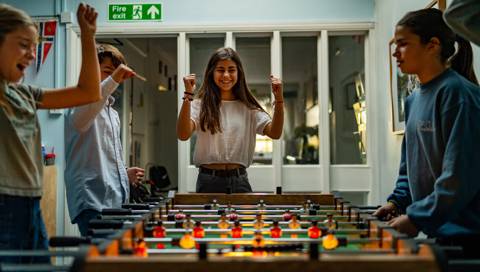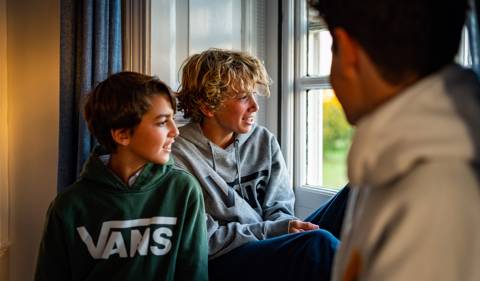12 May 2023
Switching off
As educators, we will tend to take the view that a busy child is a good child. However, when we finally give our children free time, what do they do with it? Do they immerse themselves in a solitary voyage into the virtual world or do they choose to enjoy each other’s company?
Do not worry—this will not be an anti-tech rant. The children at Walhampton are digital natives and they move in a world of staggering access to information and entertainment. We must champion the use of technology to enhance learning. The working world for which we are preparing children to enter will undoubtedly be technology-led; so having technology know-how is crucial. Nevertheless, it is one thing to be tech savvy, and quite another to have the self-mastery to know how and when to switch on; or off.
Many are concerned that our societal reliance on devices is harming our children and we risk turning them into a zombie generation who cannot entertain themselves without access to Wi-Fi and an electric current. Dr Aric Sigman, and more recently Chloe Combi, talked cogently about this in their Kitchen Talks. We also have Lorraine Lee coming to Walhampton on May 23. Click here to sign up.

We have all had the experience of sitting in a restaurant – a fundamentally social and interactive human space – and looking about to see children plugged in, eyes down. This is a sad sight if you believe in the art of conversation and a worrying indicator of the tendency to use technology as an easy pacifier, filling time that could be used more creatively – or even by just being bored. Dr Teresa Belton, visiting fellow at the University of East Anglia’s School of Lifelong Learning, recently argued that cultural expectations about children being constantly active and occupied was harming creative development. She put forward the theory that being creative “involved being able to develop internal stimulus” and “children need to have stand-and-stare time, time imagining and pursuing their own thinking processes or assimilating their experiences through play or just observing the world around them.”
Quite right. When you walk around the boarding house here, you might see the odd international boarder facetiming a parent back home, but you are much more likely to see them engaging with one another, making their own entertainment, football and cricket on the lawn, round the garden, board games, story time, reading, enjoying a hot chocolate and treat night, or just passing the time together. Walhampton children do not tend to be zombies.

To keep our sanity, and our face-to-face conversations alive, please see below five suggested ways to help:
1. Device-free dinners - this leads to engaging conversations, especially when we don’t have easy access to answering questions about topics that come up.
2. Homework that requires use of their Chromebook should not allow any other tabs to be opened/used. It is not without temptations, lapses (I can relate!). We can stay involved by asking how things are going and by looking at their work. Try to focus much more on the positives than the negatives—saying how great they have done when staying on task rather than complaining that it is not long enough.
3. Screen-free bedrooms at bedtime. No phones, tablets, TV’s or computers in the bedroom at all.
4. Leave your devices at home during family outings. You will get a lot of resistance to this one, but stand firm. The children will concede.
5. Don't feel pressurised to buy your children devices before they need them. Mobile phones in particular are best left as long as possible and a simple text and calls-only phone is all they need at first.
There is some more advice on this from Bill Gates here: https://sg.theasianparent.com/best-age-smart-phone-kids/


